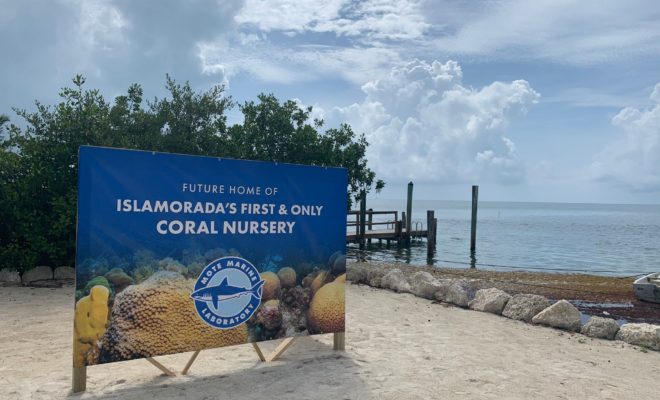
People & Business
Coral Restoration Takes Center Stage on World Oceans Day
At a press conference earlier today in Islamorada, Mote Marine Laboratory & Aquarium announced plans for future development to further coral reef research and restoration in the Florida Keys and in Sarasota. This announcement, made on World Oceans Day, is in direct response to the urgent plight Florida’s Coral Reef is facing. Warming waters, more acidic conditions due to higher carbon emissions, a devasting coral disease and other stressors have left our once abundant, thriving reef near the brink of extinction.
Mote, a global leader in marine research and conservation since its founding in 1955, has been actively paving the way in science-based restoration efforts in the Florida Keys for over 25 years. With a growing staff of highly revered and heavily published PhDs and expert practioners, Mote is the only organization completing the entire restoration loop under one entity: from assisting sexual-reproduction cycles, to rearing the next generation of coral, to resilience testing, asexual fragmentation with scaled up outplanting and extensive monitoring. To date, Mote has outplanted over 78,000 coral fragments on Florida’s Coral Reef, with a survival rate of over 90% in most cases. Additionally, thousands of corals are growing in Mote’s land-based nursery on Summerland Key and Mote’s two underwater nurseries in the Lower Keys.
This morning, Dr. Michael P. Crosby, Mote President & CEO, shared Mote’s plans to build an additional land-based coral nursery on the property of famed Bud n’ Mary’s Marina in Islamorada in the Upper Keys—the first of its kind in Islamorada. “We’ve been incredibly successful with our efforts in the Lower Keys, but to meet the urgent demand of restoring our rapidly declining reef, we must double our operations and capacity to serve additional parts of the reef tract.”
Late last year, National Oceanic and Atmospheric Administration (NOAA) announced its initiative Mission: Iconic Reefs, which identified seven “iconic reefs” in the Florida Keys that will receive a concentrated, collective effort of restoration support in the coming decades. Cheeca Rocks, a prominent reef near Islamorada, is one of the identified Iconic Reefs and the focus of Mote’s targeted response with the new coral nursery. Crosby adds, “the Islamorada community has a rich history of world-class fishing, diving and ocean recreation, and in many ways is the heartland of the Florida Keys. Mote is honored to establish Islamorada’s first science-based coral nursery as part of our broader strategic reef restoration and science education mission.”
The new nursery was not the only partnership unveiled during the press conference. Islamorada Conservation and Restoration Education, I.Care, is Islamorada’s newest environmental awareness organization, focusing on a community-based approach to coral restoration. They will work with citizen-divers to help outplant and monitor Mote-supplied coral fragments onto Islamorada’s reefs. Dr. Kylie Smith, co-founder of I.Care explains, “true advocacy, conservation and education comes from hands-on experiences with citizen scientists. Giving the citizens and visitors of Islamorada the tools and ability to save our reefs may be the difference we need to ensure our reef can survive now and for future generations.”
In addition to the new partnerships in the Florida Keys, Mote recently announced that it is moving forward on building a new coral gene bank within the 200-acre Mote Aquaculture Research Park in east Sarasota County. Crosby explained, “this gene bank is an eco-vault like no other, a modern-day Noah’s Ark, that will ensure we will never lose the diversity of coral that makes our reef so special.” This gene bank, purposefully chosen to be built at an inland location, will be housed in a Category-5 hurricane resistant building, with state-of-the-art environmental systems and controls. Mote already has over 1,600 individual genotypes of corals from 17 different species of Florida coral in their care. Crosby added that “Mote now has one of the largest single collections of living coral genetic diversity in existence, and our long-term strategy is to extend our coral gene bank’s capacity to hold species and genotypes from reefs around the world.”



You must be logged in to post a comment Login